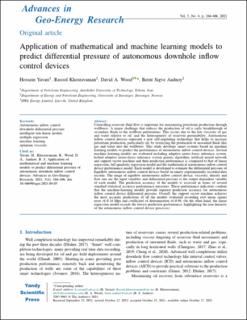| dc.contributor.author | Yavari, Hossein | |
| dc.contributor.author | Khosravanian, Rasool | |
| dc.contributor.author | Wood, David A. | |
| dc.contributor.author | Aadnøy, Bernt Sigve | |
| dc.date.accessioned | 2023-02-17T09:44:54Z | |
| dc.date.available | 2023-02-17T09:44:54Z | |
| dc.date.created | 2021-11-04T15:13:09Z | |
| dc.date.issued | 2021 | |
| dc.identifier.citation | Yavari, H., Khosravanian, R., Wood, D. A., & Aadnoy, B. S. (2021). Application of mathematical and machine learning models to predict differential pressure of autonomous downhole inflow control devices. Advances in Geo-Energy Research, 5(4), 386-406. | en_US |
| dc.identifier.issn | 2207-9963 | |
| dc.identifier.uri | https://hdl.handle.net/11250/3051859 | |
| dc.description.abstract | Controlling reservoir fluid flow is important for maximizing petroleum production through wellbores. A major challenge that reduces the production of oil is early breakthrough of secondary fluids to the wellbore perforations. This occurs due to the low viscosity of gas and water relative to oil, and the heterogeneity of reservoir permeability. Autonomous inflow control devices represent a new self-regulating technology that helps to increase petroleum production, particularly oil, by restricting the production of unwanted fluids like gas and water into the wellbores. This study develops smart systems based on machine learning models to predict the performance of autonomous inflow control devices. Several machine learning models are evaluated including adaptive neuro fuzzy inference system, hybrid adaptive neuro-fuzzy inference system genetic algorithm, artificial neural network and support vector machine and their prediction performance is compared to that of linear regression, full quadratic regression model and the mathematical autonomous inflow control device performance model. Each model is developed to estimate the differential pressure of Equiflow autonomous inflow control devices based on ninety experimentally recorded data records. The range of equiflow autonomous inflow control device, viscosity, density and flow rate are the input variables and differential pressure is the output dependent variable of each model. The prediction accuracy of the models is assessed in terms of several standard statistical accuracy performance measures. These performance indicators confirm that the machine-learning models provide superior prediction accuracy for autonomous inflow control device differential pressure. Overall, the support vector machine achieves the most accurate predictions of all the models evaluated recording root mean square error of 0.14 Mpa and coefficient of determination of 0.98. On the other hand, the linear regression model records the lowest prediction performance, highlighting the non-linearity of the autonomous inflow control device processes. | en_US |
| dc.language.iso | eng | en_US |
| dc.publisher | Yandy Scientific Press | en_US |
| dc.rights | Navngivelse 4.0 Internasjonal | * |
| dc.rights.uri | http://creativecommons.org/licenses/by/4.0/deed.no | * |
| dc.title | Application of mathematical and machine learning models to predict differential pressure of autonomous downhole inflow control devices | en_US |
| dc.type | Peer reviewed | en_US |
| dc.type | Journal article | en_US |
| dc.description.version | publishedVersion | en_US |
| dc.rights.holder | The authors | en_US |
| dc.subject.nsi | VDP::Teknologi: 500 | en_US |
| dc.source.pagenumber | 386-406 | en_US |
| dc.source.volume | 5 | en_US |
| dc.source.journal | Advances in Geo-Energy Research | en_US |
| dc.source.issue | 4 | en_US |
| dc.identifier.doi | 10.46690/ager.2021.04.05 | |
| dc.identifier.cristin | 1951488 | |
| cristin.ispublished | true | |
| cristin.fulltext | original | |
| cristin.qualitycode | 1 | |


